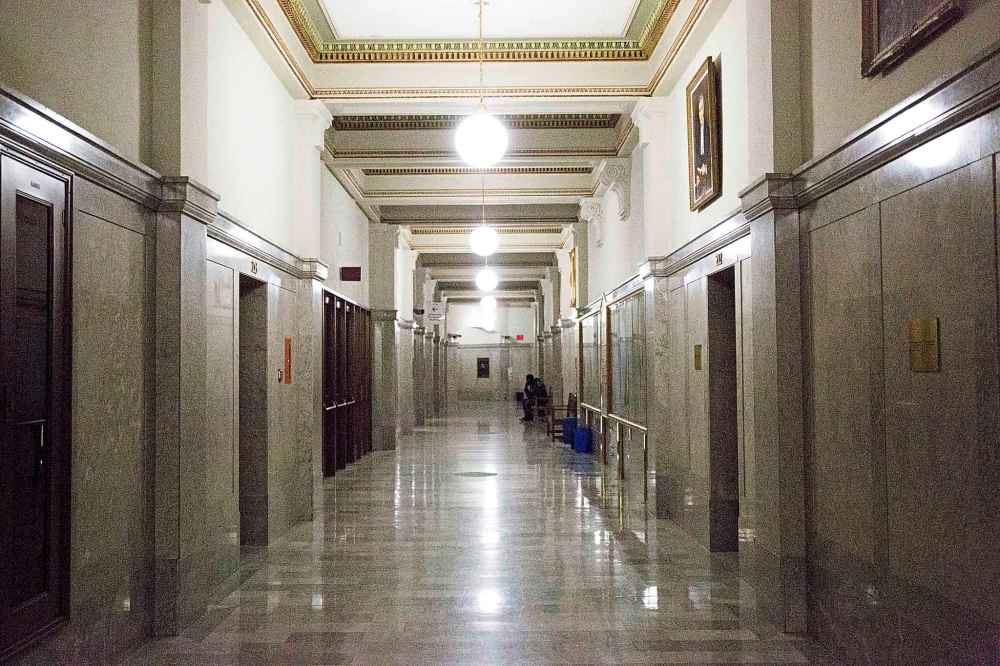‘Nobody’s helping them’: Manitoba’s Indigenous courtworker program on decline
Read this article for free:
or
Already have an account? Log in here »
To continue reading, please subscribe:
Monthly Digital Subscription
$0 for the first 4 weeks*
- Enjoy unlimited reading on winnipegfreepress.com
- Read the E-Edition, our digital replica newspaper
- Access News Break, our award-winning app
- Play interactive puzzles
*No charge for 4 weeks then price increases to the regular rate of $19.00 plus GST every four weeks. Offer available to new and qualified returning subscribers only. Cancel any time.
Monthly Digital Subscription
$4.75/week*
- Enjoy unlimited reading on winnipegfreepress.com
- Read the E-Edition, our digital replica newspaper
- Access News Break, our award-winning app
- Play interactive puzzles
*Billed as $19 plus GST every four weeks. Cancel any time.
To continue reading, please subscribe:
Add Free Press access to your Brandon Sun subscription for only an additional
$1 for the first 4 weeks*
*Your next subscription payment will increase by $1.00 and you will be charged $16.99 plus GST for four weeks. After four weeks, your payment will increase to $23.99 plus GST every four weeks.
Read unlimited articles for free today:
or
Already have an account? Log in here »
Hey there, time traveller!
This article was published 12/02/2020 (2131 days ago), so information in it may no longer be current.
A court program designed to help Indigenous people navigate the justice system is having to make do with less, even as Manitoba maintains the highest incarceration rate of any province with a majority of Indigenous inmates.
Funding to the Indigenous Courtwork program (formerly known as Aboriginal Court Workers) was cut in 2017 and 2018, according to federal-government documents obtained by the Free Press through access-to-information laws.
The decline in provincial contributions, which is under a 50-50 cost-sharing agreement with the federal justice department, means federal dollars designated for Indigenous court programs have also been diverted out of Manitoba.
However, Manitoba Justice says its combined $1-million annual budget for the program hasn’t changed, even though it says expenses are down due to staff turnover and retirements.

Manitoba’s Indigenous court workers program is the only one in the country run directly by a provincial government. Its complement of staff has dwindled to half of what it once was, and its client numbers have dropped as well.
There are seven Indigenous court workers now with the program, the province said Wednesday. That’s compared with 15 employees in 2014, the obtained documents show.
The workers helped 7,590 clients in 2018-19, compared with more than 10,000 two years earlier, according to the provincial justice department annual reports.
The program workers are expected to help Indigenous people understand the court process and their rights, and are typically called upon to be present with an accused in the courtroom or speak to them in their first language. Similar programs have been in place across Canada for more than 40 years.
In Manitoba, Indigenous court workers are expected to travel to circuit courts across the province and offer services in Cree, Ojibwa, Oji-Cree, Dakota and English.
As provincial budgets for the program shrunk, federal funding has been left on the table, the Ottawa briefing-note documents show. The program’s budget was reduced by 25 per cent from 2018 to 2019.
“Thompson court is where everybody comes, from the North. They need somebody there, because people need the help, and nobody’s helping them.”– Thompson resident Joyce McIvor
Under a five-year agreement that expires in 2023, the federal government can contribute an annual maximum $735,313 to the program in Manitoba, but the province hasn’t been getting the full amount.
Manitoba’s justice department contributed $520,000 in 2017-18. In 2018-19, the province put up $389,000.
The provincial funding is being matched by Ottawa, the federal documents show.
Manitoba Justice didn’t grant an interview Wednesday, but its most recent annual report states funding decreases are due to job vacancies in the courtwork program.
The department issued a statement to the Free Press saying it has maintained — not cut — the program’s budget.
In the statement, the department said it recently started a consultation process about the courtworker program with members of Indigenous communities, “To ensure it continues to provide meaningful services to Indigenous clients, and this work is ongoing.”
“I cannot stress (enough) how important these individuals are to the overall functioning, the overall infrastructure of the justice system.”– NDP justice critic Nahanni Fontaine
In Thompson, the Indigenous court worker position has been vacant for more than two years.
The northern court has had problems offering timely bail hearings. Concerns about “assembly-line justice,” as one judge described it, have prompted calls for an independent review into the workings of Manitoba’s northernmost court.
Joyce McIvor, a Cree-speaking Thompson resident, was employed as an Indigenous court worker with Manitoba Justice for about a year-and-a-half before she left the job in 2017.
McIvor said training opportunities were lacking, travel requirements were demanding and the pay — roughly $40,000 annual salary, she said — was lower than expected for the north.
“Thompson court is where everybody comes, from the north,” she said Wednesday.
“They need somebody there, because people need the help, and nobody’s helping them.”
The job vacancies are “incredibly problematic,” said NDP justice critic Nahanni Fontaine.
She said even one fewer Indigenous court worker position could affect proper access to justice for potentially hundreds of people.
“I cannot stress (enough) how important these individuals are to the overall functioning, the overall infrastructure of the justice system,” she said, saying courts can be “arduous and intimidating” at the best of times, even when the accused speaks English.
“All of these seemingly benign cuts translate in the system exponentially. So it really does bear witness to the lack of concern and urgency that this government has towards fixing justice, in particular as it relates to Indigenous peoples,” Fontaine said.
Roughly three-quarters of people incarcerated in Manitoba are Indigenous. Statistics Canada data released last year showed Manitoba had the highest adult incarceration rate of all provinces, at 231 per 100,000 population.
— with files from Dylan Robertson
katie.may@freepress.mb.ca
Twitter: @thatkatiemay

Katie May is a general-assignment reporter for the Free Press.
Our newsroom depends on a growing audience of readers to power our journalism. If you are not a paid reader, please consider becoming a subscriber.
Our newsroom depends on its audience of readers to power our journalism. Thank you for your support.









